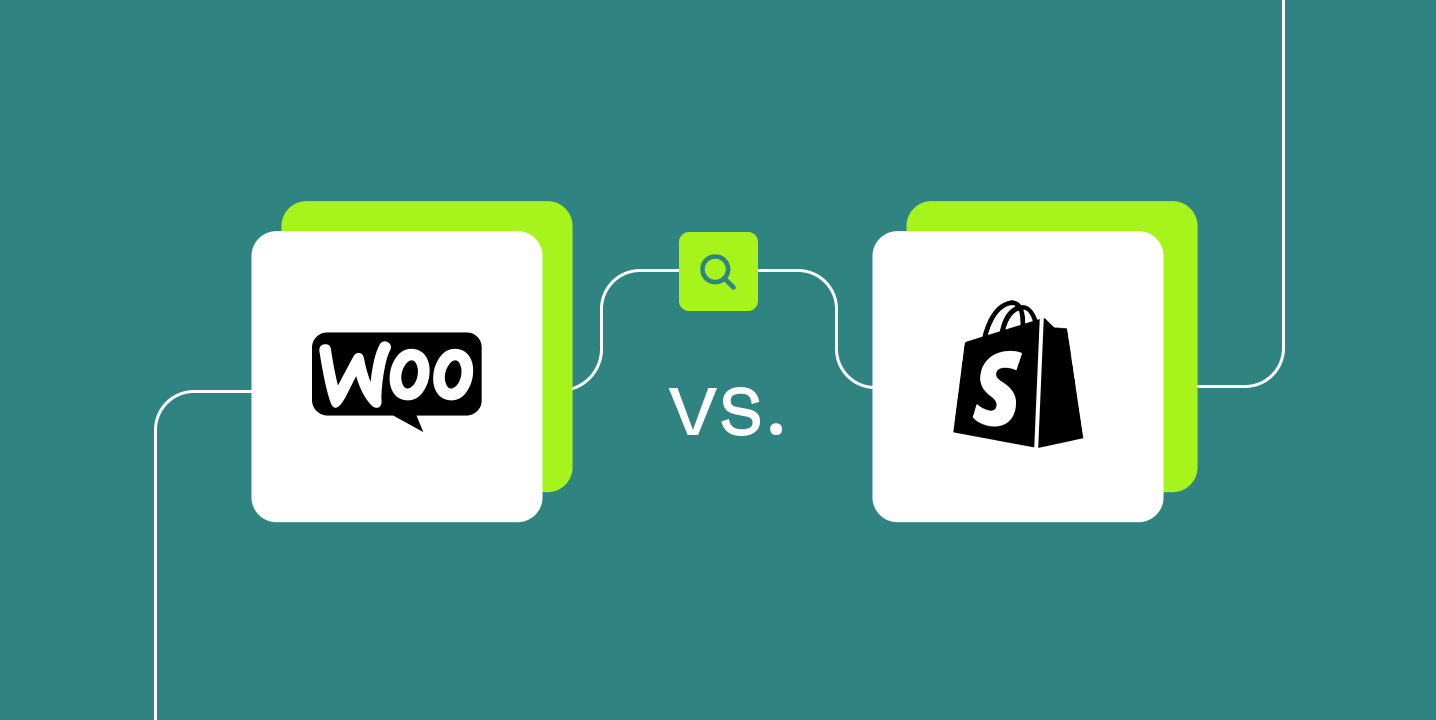Shopify Vs WooCommerce | Which is More Feature-rich eCommerce Platform?
In today's digital age having a robust and feature-rich eCommerce platform is crucial for businesses to thrive online. Shopify and WooCommerce are two leading players in the eCommerce market offering powerful tools and features to help entrepreneurs establish and grow their online stores. Both platforms have their own strengths and cater to different types of businesses.
WooCommerce versus Shopify: a clash of two e-commerce titans. Shopify powers over 800000 online businesses but WooCommerce claims to be the most popular e-commerce platform on the web - so who wins?
There has never been a better moment to open an online shop with global e-commerce sales approaching $5.7 trillion. However deciding between WooCommerce and Shopify as the finest e-commerce platform isn't always easy.
Overview
Most consumers choose a feature-rich design flexibility and straightforward pricing when selecting the top eCommerce websites. Furthermore each platform has its own set of obstacles. But what are the differences between e-commerce systems? Is Shopify or WooCommerce a better option for your business? The answer is in the characteristics you feel your e-commerce shop need.
Tobias Lütke and Scott Lake founded Shopify in 2006 as a full-service e-commerce solution. After creating an online shop for snowboarding equipment the creators created the platform. They were unhappy with the current e-commerce systems and decided to build their own. You don't have to worry about the technical aspects of operating an internet shop since it's a hosted service. You also do not need to buy a separate hosting plan.
WooCommerce on the other hand is an open-source plugin that you install alongside the WordPress Content Management System (CMS). It was built by the WordPress theme company WooTheme before being bought by Automattic in 2015. If you're a WordPress user you can install and activate WooCommerce just like any other WordPress plugin. If you don't already have a website you'll need to use WordPress as your CMS and build one before you can install the plugin.
Read Next: How Shopify Unlocks Advanced Capabilities for Merchants With AI Integration?
Shopify Vs WooCommerce Comparison

In this blog post we will delve into the comparison between Shopify and WooCommerce exploring their features flexibility scalability and more to help you determine which platform is more suitable for your eCommerce needs.
1. Ease of Use:
One of the most significant factors to consider when choosing an eCommerce platform is its ease of use.
- Shopify is renowned for its user-friendly interface making it incredibly simple for beginners to set up and manage their online stores. It offers a drag-and-drop website builder a wide range of customizable themes and an intuitive dashboard that allows users to manage their products orders and inventory with ease.
- On the other hand WooCommerce is a plugin for WordPress which means it requires some technical knowledge to install and set up. While WooCommerce offers flexibility and customization options it may take more time and effort to navigate for those unfamiliar with WordPress.
2. Flexibility and Customization:
- When it comes to flexibility and customization WooCommerce takes the lead. Being built on WordPress the most popular content management system it offers an extensive library of plugins and themes allowing users to customize their online stores to meet their unique requirements. WooCommerce provides complete control over the design and functionality of your store making it an excellent choice for businesses with specific customization needs.
- Shopify on the other hand has a more limited range of themes and customization options. Although it offers a theme editor and supports HTML and CSS customization the flexibility is not as extensive as WooCommerce.
3. Scalability and Performance:
Scalability is crucial for an eCommerce platform as businesses aim to grow and expand their online presence.
- Shopify is a hosted platform which means it takes care of the server infrastructure and performance optimization for its users. This ensures that your online store can handle high traffic and sales without any technical hassles. Shopify offers unlimited bandwidth 99.99% uptime and automatic backups to ensure a smooth shopping experience for your customers.
- WooCommerce on the other hand relies on your hosting infrastructure which means you are responsible for ensuring server performance and scalability. While this gives you more control it also requires more technical expertise to manage and optimize your store's performance.
4. Payment Options and Security:
Both Shopify and WooCommerce offer a wide range of payment options to cater to customers' preferences.
- Shopify has its payment gateway Shopify Payments which eliminates the need for third-party integrations. It also supports popular external payment gateways like PayPal and Stripe. WooCommerce integrates seamlessly with various payment gateways including PayPal Stripe Authorize.Net and more.
- As for security Shopify provides SSL certificates and ensures PCI compliance for secure transactions. WooCommerce also offers SSL support but the security largely depends on the hosting provider and the measures you implement.
Pricing:
Pricing is a crucial aspect when choosing an eCommerce platform especially for small businesses and startups.
- Shopify offers different pricing plans starting from $39* per month for the Basic plan up to $399 per month for the Advanced plan. It also offers a Starter plan for $1* per month which allows you to add a "Buy" button to your existing website or social media channels. Additionally transaction fees may apply depending on the payment gateway you choose.
- WooCommerce being an open-source plugin is free to download and use. However you will incur costs for hosting domain registration themes and plugins which can vary depending on your specific requirements.

Shopify Advantages and Disadvantages
Shopify Pros
- You know precisely how much you'll pay each month and the price is reasonable.
- Thousands of applications are available to help you expand your shop.
- The topics are many and lovely.
- Shopify takes care of everything from hosting to security.
- It just takes a few minutes to get your business up and running.
- Dropshipping is a breeze with Shopify.
- The customer service is the finest in the industry.
Shopify Cons
- Shopify gives you less control over your website.
- Other systems allow for more customization.
- You're saddled with an ever-increasing monthly bill.
WooCommerce Advantages and Disadvantages
WooCommerce Pros
- WooCommerce allows us total flexibility and control.
- WordPress has a sizable online community.
- Themes and plugins are limitless since anybody may create and sell them online.
- WooCommerce is easy to set up on WordPress.
- The WooCommerce plugin is completely free.
WooCommerce Cons
- WordPress has a steep learning curve.
- Because of plugins themes and hosting WooCommerce may wind up being more costly.
- You're responsible for everything from hosting to security maintenance to backups.
Shopify Vs WooCommerce: Which one to choose?
Shopify and WooCommerce are both fantastic solutions for your eCommerce website. But it doesn't mean you should just choose one and run with it. Make sure you make an educated decision. Shopify is the ideal option if you're new to developing an eCommerce website and want a DIY-style experience. It allows you enough customization to make your website distinctive while being straightforward and easy to grasp.
WooCommerce is for you if you have some expertise with custom website building or if you currently have a fully functional custom WordPress website. It integrates seamlessly with your current website and gives plenty of flexibility for easy personalized changes.
As it turns out Shopify is our preferred option out of the two. Not only is it strong dependable and simple to use but it also has beautiful templates and excellent customer service.
That's not to imply WooCommerce isn't capable of competing. This clever e-commerce plugin transforms any WordPress site into a strong online shop and it's also an open-source platform so it's free to install.
We've analyzed all of the important differences between WooCommerce and Shopify and you now have everything you need to choose the right platform for you.
Today's winner though is Shopify. Both systems are fantastic but Shopify wins the contest because to its built-in sales features improved simplicity of use and short construction time. Pricing is very straightforward; everything you need is included in its plainly priced programs.







